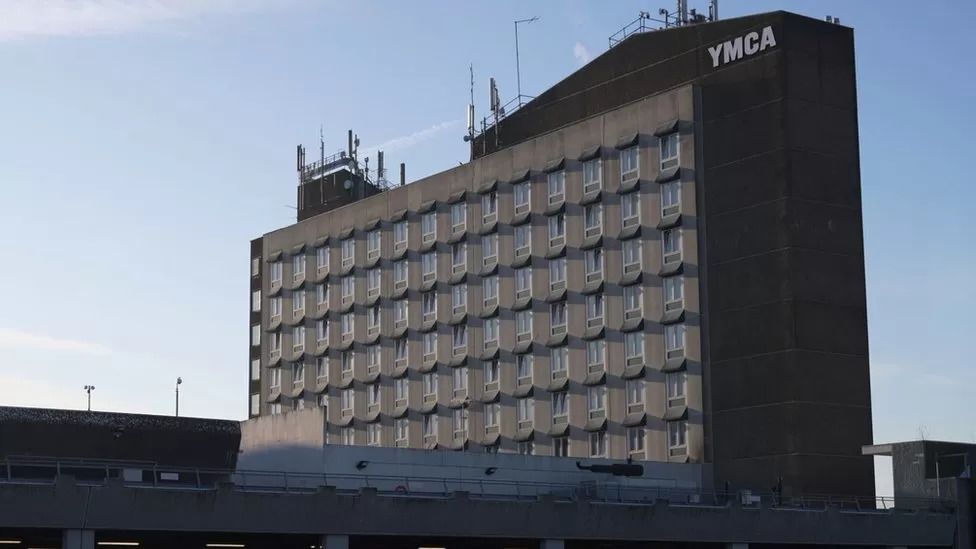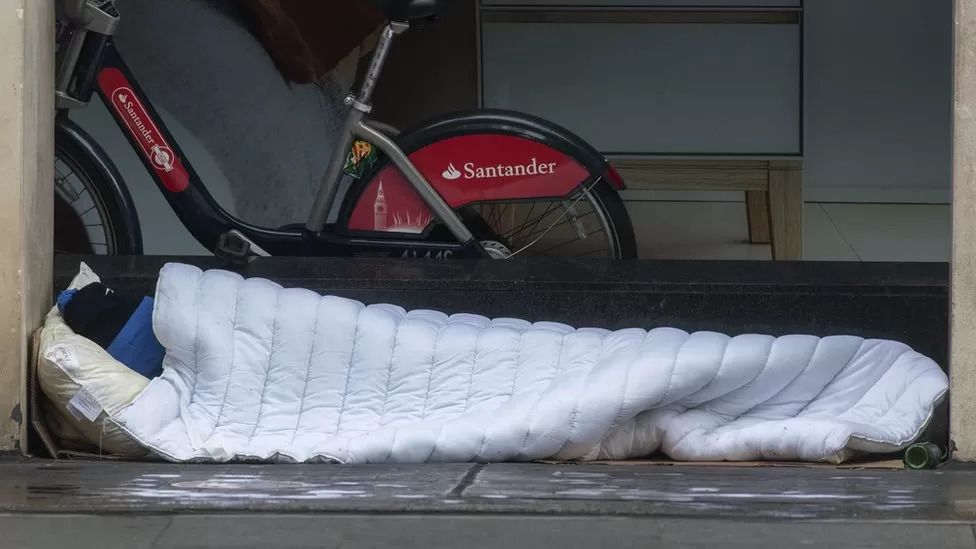
How Watford got all its homeless people off the streets
The moment of clarity for Graham Beard came after he'd swallowed 300 pills. Within minutes of him calling the police, they arrived. They found another 1,400 tablets on him and took him immediately to hospital.
"I'd attempted suicide two or three times before," he says. "So even after taking tablets, I could feel myself going down that road again. I've had mental health problems since 2005."
After receiving treatment, Graham was discharged, back to sleeping on the streets of Watford. The 57-year-old chef had ended up sleeping rough after his marriage broke down.
At first he sofa-surfed, but then soon ran out of options. His alcoholism and psychiatric problems - he suffers from recurrent depressive disorder - contributed to his fate.
'If it wasn't for them, I'd be dead'
After three weeks on the streets, a benefit payment came through, allowing him to pay for a few nights in a local hotel. There, he got advice to contact New Hope, a local homeless charity, who immediately passed him on to the YMCA and he hasn't looked back since.
"They couldn't have done any more for me," says Graham. "If it wasn't for them, I'd be dead."
 Each floor of Watford's Charter House is designed for people on different stages in the programme
Each floor of Watford's Charter House is designed for people on different stages in the programme
Graham now stays at Charter House, a 10-storey building in the centre of Watford. By the time he arrived, the YMCA had already established an initiative that should ensure Graham never ends up homeless again.
Called Dynamic Pathway to Independence (DPI), the five-step scheme is designed to support all homeless people in the Hertfordshire town, not just rough sleepers.
The initiative was set up in March 2020, at the start of the pandemic, when the government ordered all councils to provide accommodation for every rough sleeper in their area.
Watford say they had 83 "known and verified" rough sleepers or people at risk of rough sleeping. But instead of simply keeping them indoors for a few weeks, they decided to try to ensure no-one returned to the streets. By January 2021, the council reported they had no rough sleepers.
 Homeless charity Crisis says rough sleeping in England has increased by 20% in the past 12 months
Homeless charity Crisis says rough sleeping in England has increased by 20% in the past 12 months
The scheme sees people supported to move through different stages, working with a range of experts from addiction and mental health specialists through to employment and housing. The stage at which each person enters the process varies depending on what their needs are, as does the speed which they move on.
The programme is delivered entirely in Charter House. Each floor is painted a different colour, depending on which stage it represents, and can house 22 people. Some floors have therapy rooms while others are like self-contained flats. Crucially, people who experience problems and setbacks are allowed to move back a stage rather than be evicted.
Homelessness on the rise
Graham is currently at stage three, living in his own studio flat in Charter House, cooking for himself and, occasionally, some of the other residents.
"Because of the complexity of the issues around homelessness we know that accommodation on its own is not enough," says Peter Taylor, the town's mayor. "People need support with a range of complicated issues to help them to turn their lives around."
Mark Turner, the chief operating officer at One YMCA, who worked with the council to devise the strategy says it was made quicker and easier "because purse strings were opened a little bit".
The government gave Watford almost £1.1m in the first two years of the initiative and have committed a further £1.6m between 2022 and 2025 to keep the programme going.
The money is part of the government's aim to end rough sleeping in England by the end of 2024. They've committed to spending £2bn in this parliament tackling homelessness, including £500m specifically on rough sleeping initiatives.
There are currently around a dozen rough sleepers in Watford despite the DPI scheme, an indication that homelessness is on the rise. In London, where rough sleeping has always been more acute, the latest data shows a 24% increase in the number of rough sleepers between July and September; following a 16% increase between April and June.
Matt Downie, chief executive of homeless charity Crisis, says the rise is "deeply worrying" with nearly 3,000 people sleeping on the streets across England on any given night.
"This is unacceptable and as mounting pressure is piled on household finances, urgent action is needed to prevent the number of people rough sleeping escalating further."
He is clear what he thinks needs to be done. "We need the government to commit to building affordable housing and investing in housing benefit to cover the true cost of rent," he says.
Back in Watford, most of the original 83 homeless people remain within the scheme "progressing positively," says Mark Turner. "We see it as a five-year journey."
Graham's immediate goal is to improve his mental health. A job, he feels, might be beyond him, due to both his age and a fear that his psychiatric disorder might deter employers.
As for his own home? "I'd love my own place, as long as it's in Watford and I continue to get support."










